Please use this identifier to cite or link to this item:
http://hdl.handle.net/10553/55017
| Title: | Seafood consumption, omega-3 fatty acids intake, and life-time prevalence of depression in the PREDIMED-plus trial | Authors: | Sánchez-Villegas, Almudena Álvarez-Pérez, Jacqueline Toledo, Estefanía Salas-Salvadó, Jordi Ortega-Azorín, Carolina Zomeño, Maria Dolores Vioque, Jesús Martínez, Jose Alfredo Romaguera, Dora Pérez-López, Jessica López-Miranda, José Estruch, Ramón Bueno-Cavanillas, Aurora Arós, Fernando Tur, Josep A. Tinahones, Francisco J. Lecea, Oscar Martín, Vicente Ortega-Calvo, M. Vázquez, Clotilde Pintó, Xavier Vidal, Josep Daimiel, Lidia Delgado-Rodríguez, Miguel Matía, Pilar Corella, Dolores Díaz-López, Andrés Babio, Nancy Muñoz, Miguel Ángel Fitó, Montserrat de la Hera, Manoli García Abete, Itziar García-Rios, Antonio Ros, Emilio Ruíz-Canela, Miguel Martínez-González, Miguel Ángel Izquierdo, Marisol Serra-Majem, Lluis |
UNESCO Clasification: | 3206 Ciencias de la nutrición | Keywords: | Physical-Activity Questionnaire Polyunsaturated Fatty-Acids Fish Consumption N-3 Metaanalysis, et al |
Issue Date: | 2018 | Project: | Efecto de la Dieta Mediterránea Hopocalórica y Promoción de la Actividad Física en Prevención Primaria Cardiovascular.Estudio Piloto Sobre Marcadores Intermedios. | Journal: | Nutrients | Abstract: | Background: The aim of this analysis was to ascertain the type of relationship between fish and seafood consumption, omega-3 polyunsaturated fatty acids (-3 PUFA) intake, and depression prevalence. Methods: Cross-sectional analyses of the PREDIMED-Plus trial. Fish and seafood consumption and -3 PUFA intake were assessed through a validated food-frequency questionnaire. Self-reported life-time medical diagnosis of depression or use of antidepressants was considered as outcome. Depressive symptoms were collected by the Beck Depression Inventory-II. Logistic regression models were used to estimate the association between seafood products and -3 PUFA consumption and depression. Multiple linear regression models were fitted to assess the association between fish and long-chain (LC) -3 PUFA intake and depressive symptoms. Results: Out of 6587 participants, there were 1367 cases of depression. Total seafood consumption was not associated with depression. The odds ratios (ORs) (95% confidence intervals (CIs)) for the 2nd, 3rd, and 4th quintiles of consumption of fatty fish were 0.77 (0.63-0.94), 0.71 (0.58-0.87), and 0.78 (0.64-0.96), respectively, and p for trend = 0.759. Moderate intake of total LC -3 PUFA (approximately 0.5-1 g/day) was significantly associated with a lower prevalence of depression. Conclusion: In our study, moderate fish and LC -3 PUFA intake, but not high intake, was associated with lower odds of depression suggesting a U-shaped relationship. | URI: | http://hdl.handle.net/10553/55017 | ISSN: | 2072-6643 | DOI: | 10.3390/nu10122000 | Source: | Nutrients [ISSN 2072-6643], v. 10 (12), (Diciembre 2018) |
| Appears in Collections: | Artículos |
SCOPUSTM
Citations
44
checked on Apr 21, 2024
WEB OF SCIENCETM
Citations
34
checked on Feb 25, 2024
Page view(s)
133
checked on Mar 2, 2024
Download(s)
97
checked on Mar 2, 2024
Google ScholarTM
Check
Altmetric
Share
Export metadata
Items in accedaCRIS are protected by copyright, with all rights reserved, unless otherwise indicated.
